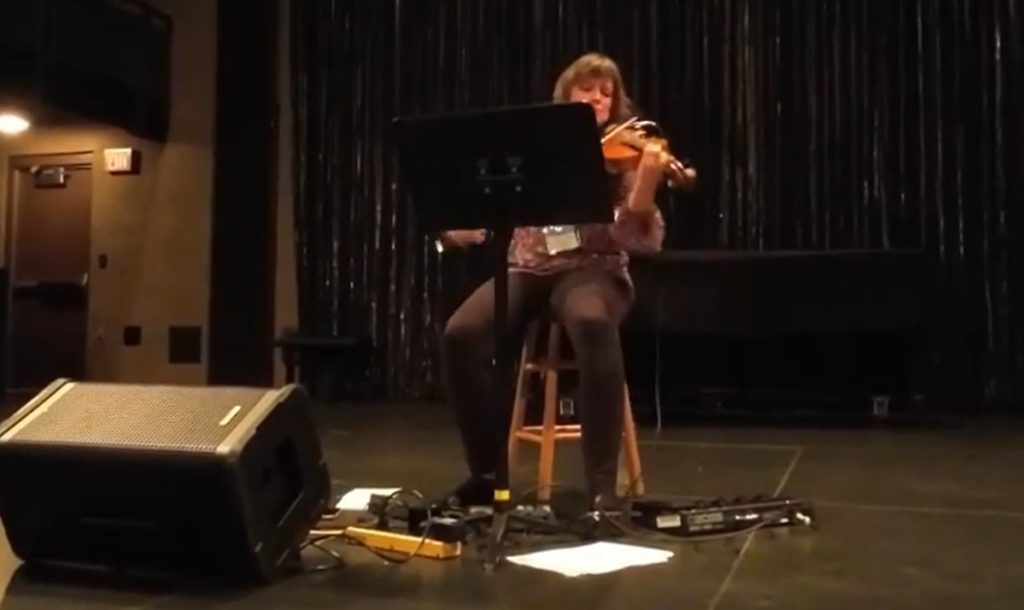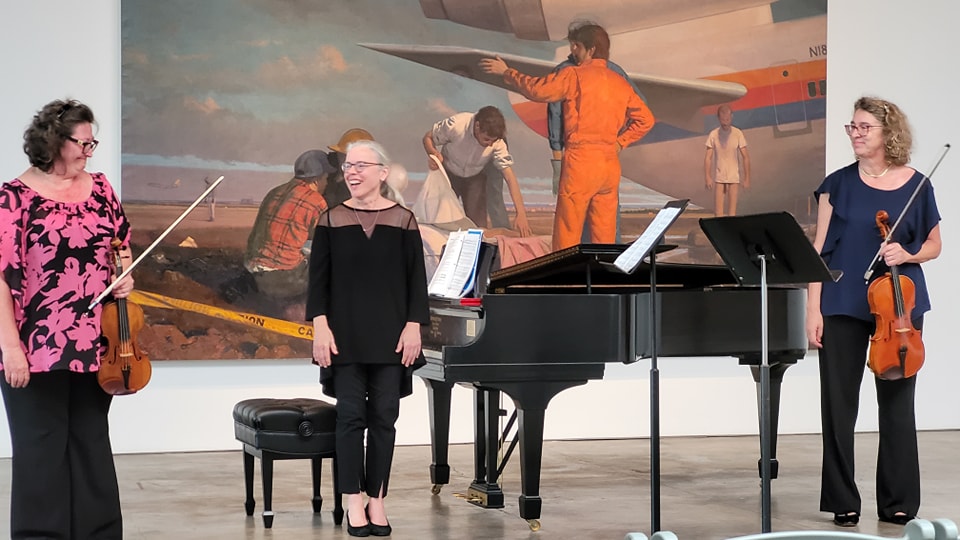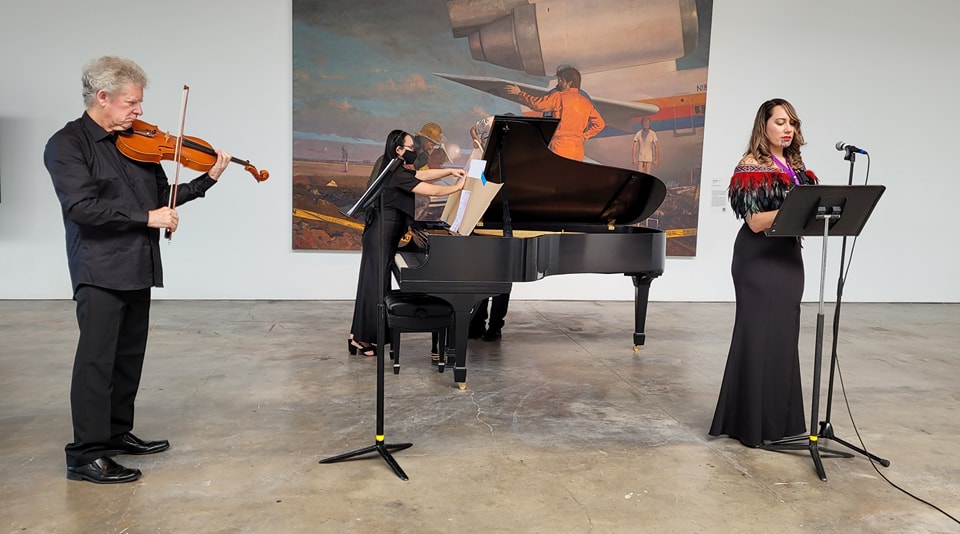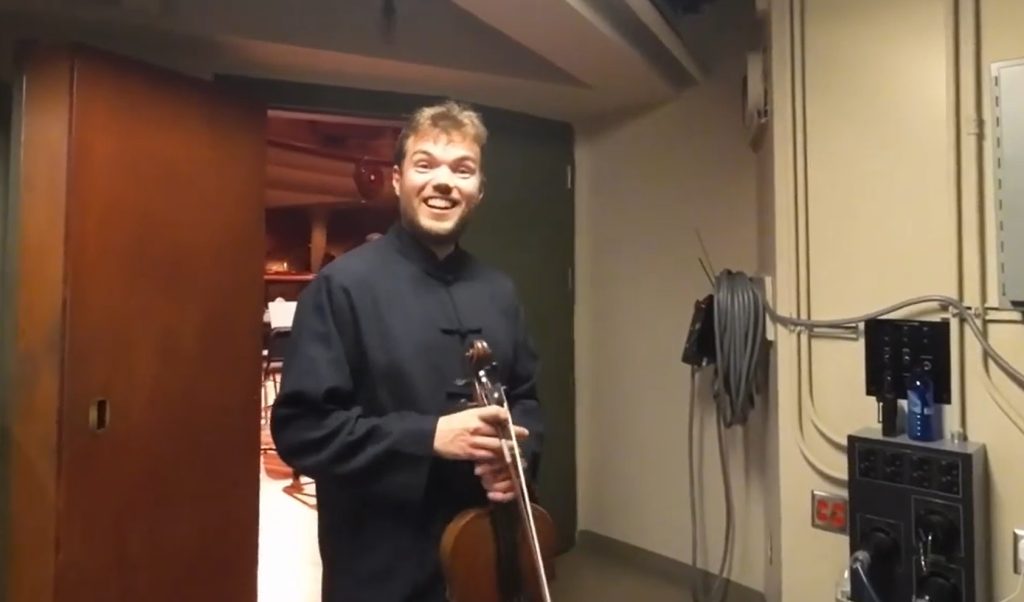The 47th International Viola Congress takes place in Columbus, Georgia (USA) from June 1st – 5th, 2022. This daily blog / report is delivered to you by DVS board member Emlyn Stam.
Day 2: Thursday, June 2nd, 2022
<previous day> <next day>
The second day of the IVC 2022 featured a packed schedule. The first recital with students from Université de Montréal started at 08:00 with Piéces de Concours. The hour was so early that none of our DVS delegates were able to attend. We were told that the unfortunate students had no opportunity to warm up because the building was closed beforehand.
The first lecture of the day was given by Sachin Shukla (a student at the New England Conservatory) on the Walton Viola Concerto. He explored the concerto’s cryptic dedication to Walton’s love interest Christabel in the context of Walton’s working class origins and Christabel’s status as a member of the nobility. His theoretical analysis of the concerto was highly original and an article in the American Viola Society’s Journal is forthcoming this fall.
Leanne Darling (State University of New York) gave an inspiring lecture recital on looping, the use of live, electronically recorded loops in solo viola repertoire. She explained the technological tools involved and gave practical advice on practicing with and using loops for improvisation. The presentation concluded with a performance of 5 fascinating contemporary works for solo viola involving looping. One of the highlights was the work Flight by New York composer Trevor New full of stilted textures, unusual in this genre of music.
A short walk to the Columbus State University’s Space Science Center followed for a recital in the omnisphere cinema. Meditative 3D animations with scientific and space-related themes accompanied the performances. This multidisciplinary experience connecting science and viola music was an interesting addition to the conference program.
This was followed by a recital featuring the previously unknown concerto for violin and viola by Ferdinand Thierot, a salon-like composition which was admirably performed by violist Jutta Puchhammer, violinist Annette-Barbara Vogel and pianist Elise Desjardins.
Daphne Gerling and Katherine Lewis gave a fine performance of Polish composer David Pajdzik’s concerto for two violas entitled Old Time Suite from 2019. The piece, a rather severe neo-classical work reminds one of Henryk Górecki’s late works.
The socially engaged, multidisciplinary performance piece Taioro ki te Ao from New Zealand was one of the highlights of the congress. The performance features the Māori spoken word performer Sharn Maree Cassady whose texts reflect on the challenges her people face as a result of colonization. The work centers indigenous narratives conveyed through Cassady’s powerful and gripping stage presence and superb sense of rhythm and intonation. The music composed by Anthony Ritchie provides a strong emotional counterpoint to the text and was performed with seriousness and verve by violist Donald Maurice and pianist Sherry Grant.
Timothy Ridout was the guest of honour for an evening concert featuring no fewer than 3 concerti accompanied by conductor Paul Hostetter and a professional orchestra pulled together for the occasion. His strong musical presence was palpable from the first note of Alessandro Rolla’s Viola Concerto in E flat major. Ridout plays with grace, incredible skill and a constant communicative sense of character. His proficiency extends to a complete knowledge of the orchestral score, a sense of engaged music making with the orchestra and an enormous pallet of sound colours which keep the listener engaged throughout. The second work on the program by Bulgarian composer Dobrinka Tabakova, called Suite in the Old Style, opened with Ridout playing a drum at the back of the orchestra. The work features uncanny orchestration with a prominent role given to the harpsichord. Tabakova draws on a myriad of influences in this attractive, colourful work including Stravinsky, Shostakovich and Bulgarian and Celtic folk musics. Compositional forms and tropes from the 18th century are used with a sense of fun and irony. The work represents a valuable contribution to the repertoire for viola and chamber orchestra. Ridout performed the piece with great zeal and a keen sense of timing. The final work of the evening was Johann Nepomuk Hummel’s Potpourri op.94. This work was previously known in a severely truncated form as the Fantasia for viola and orchestral owing to 20th century editions of the piece that cut out its middle sections. The full Potpourri contains myriad riches including variations on themes by Mozart, Rossini and others. Ridout played the work with ease and grace emphasizing its humorous character and tossing off technical fireworks with bravado. Ridout has clearly fulfilled his promise to become one of the leading violists of our time.
<previous day> <next day>
Editor’s notes:
1) You can also follow Karin Dolman’s Columbus IVC VLOG (yes, video!) on facebook, starting here, and continuing here, here, here, here, and here.
2) Even if you missed the live event, you can still register (as a “Virtual attendee”) to explore all the recorded contents (lectures, recitals, masterclasses) of this congress for another 3 months! See the Congress Website for full information.




